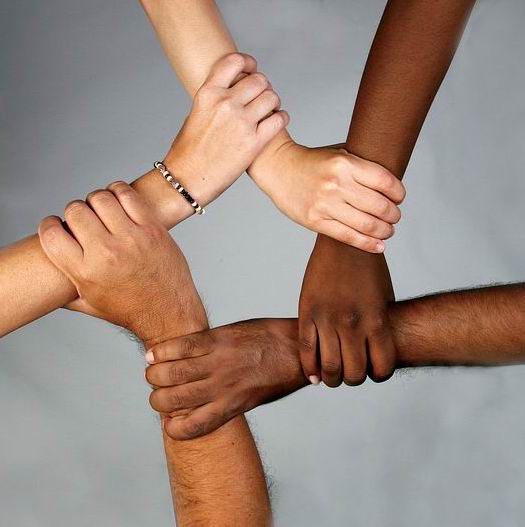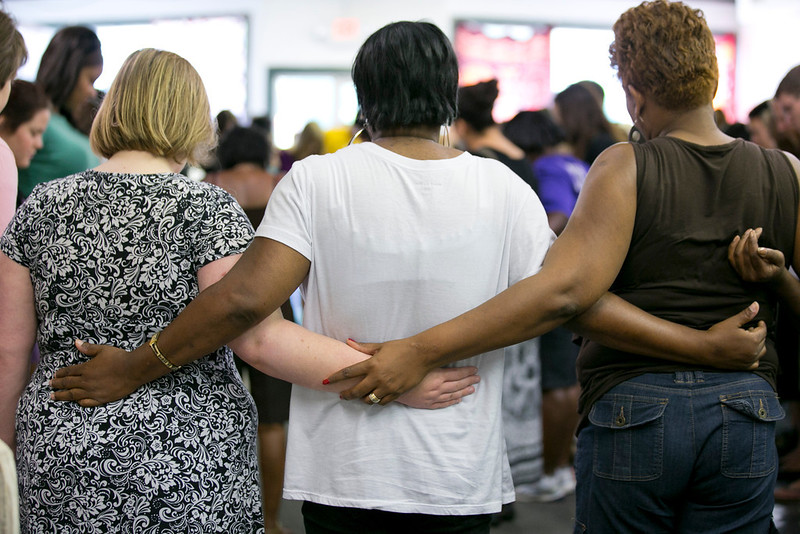Revised Common Lectionary Reflection, Seventeenth Sunday after Pentecost, Year A
September 27, 2020

Lessons: Ezekiel 18:1-4, 25-32; Psalm 25:1-9; Philippians 2:1-13; Matthew 21:23-32
Theme: God’s faithful and generous people are willing to look at the bigger picture and seek the common good so that all may have enough to thrive.
Key Scripture: Do nothing from selfish ambition or conceit, but in humility regard others as better than yourselves. Let each of you look not to your own interests, but to the interests of others.– Philippians 2:3-4
This is a hard teaching! I’m sure it was a wake up call to the Jesus followers in Philippi. It’s an especially hard teaching for the current context in which many of us find ourselves — on the brink of a major political election and more polarized as a nation than perhaps ever before. I know… “don’t go talking politics in my church, pastor!” I’ve heard that statement or ones like it with increasing frequency. What’s happened? How did we get to this point where families are divided, friends unfriend friends on Facebook, and anger is the emotion of the day. When did we decide to entrench along political party lines without really even understanding why we’re doing it? Whatever happened to “united we stand”? Are we really happier with “divided we fall”? Or is that really just a false dichotomy?
We can learn a lot about our present situation by heading back to scripture, where everything old is new again. Were Jesus walking the streets of D.C. today, preaching, teaching, and cleaning out the halls of power, he would likely be labeled a radical—or worse. He would probably be jailed for nonviolent resistance, and he would certainly be martyred for his witness.

Just mosey on back through Matthew Chapter 21 to set the context. First Jesus enters Jerusalem in triumph, but doing so on the back of a juvenile donkey. Matthew says that Jesus goes straight to the Temple and cleans house, making his house a place for all people. The temple leaders lose control as the blind, the lame, and the children take their rightful place in God’s house. Next, fed up, Jesus leaves and spends the night in Bethany. The next morning he’s back at it again, teaching in the Temple, but not before withering a fig tree that can’t provide him breakfast. Jesus takes on the religious leaders about the source of his authority and silences them. But there’s more! With the parable of the two sons he lays bare their biases and claims to righteousness with the news that “…the tax collectors and prostitutes are going into the kingdom of God ahead of you” (Matt. 21:31b). Ouch! And Jesus is just getting started. Now, how might you see this scene playing out today?
Who are the current power holders that Jesus would expose? I would guess the pundits, media outlets, and trolls that have perfected the art of dividing us for their own personal gains in power, ratings, and financial reward. Perhaps it would be those who champion individual rights no matter who gets hurt in the process. Maybe Jesus would even go so far as to turn over a few “reserved pews” in some of our houses of worship that preach a thinly veiled version of nationalistic religion. Think I’m being too harsh? Read your Bible, study the context, and be ready to encounter a whole new Christ. (Hint: He doesn’t look like those classic Warner Sallman Jesus paintings that so many Americans grew up seeing, and he’s probably pretty ticked off right now by how we’re treating one another and the created world.)
Now that you may be a little lathered up and spoiling for a debate, let’s take a deep, cleansing breath. The good news is that the Christ wants all creation to flourish; in fact that work has already commenced. Our job is to get out of the way and focus on loving God with every fiber of our being and our neighbor as ourselves. Oh, and don’t forget Jesus’ teaching about loving your enemies, too. Friends, we can’t afford to be Christians who cherry-pick scripture like a box of assorted chocolates.
Let’s dig deeply into the entire holy pottage of God’s desire for community and our human propensity to mess it all up. God’s been focusing on community since God spoke everything into being with “let us,” not “let me.” We can’t do this difficult work on our own, but by the grace of God, the love of Christ, and the nudging of the Holy Spirit we can lean into community, converse across divides, and find common ground. That work is ongoing, although not as much in the church as in other community settings. Let’s change that, and as Jesus people live like we mean it.

The Bantu word “Ubuntu” is often translated as “I am because we are.” This wisdom teaching of African ancestors is the same divine wisdom that Paul writes in Philippians, saying “Let each of your look not to your own interests, but to the interests of others.” That’s how community works. When you look out for others, others look out for you. Blessings on your bold and faithful proclamation!
In Worship
What does community mean to your congregants? Do divisions simmer beneath a shiny veneer of “nice”? Why not consider the concept of Ubuntu and show the short video clip (below) of the Rev. Mpho Tutu, an Episcopal priest and executive director of the Desmond & Leah Legacy Foundation?
Consider giving each worshiper a small card with ME printed on one side and WE printed on the other. Invite them to pray with the card and the lesson from Philippians every day this week and then commit to one community-minded action.
With Youth
Spend some time reflecting on the parable Jesus offers in response to the chief priests and elders questioning his authority to preach and teach (Matthew 21:28-32). Have your parents or grandparents ever asked you to do something and you say you will but actually have no intention of doing it (or doing it in a timely manner)? Jesus asks if it’s better to say no, and then change your mind. What do you think?
We have to remember that Jesus’ culture was based on honor and shame. It would have been shameful for a son or daughter to say they would do something and then willfully ignore the request. Yet to give an honest no and then change one’s mind is better. Why?
What does this teach us about repentance and the act of turning our lives around? How might we incorporate this teaching into our daily lives?
With
Children
This week’s focus verse is Philippians 2:4 – Let each of
you look not to your own interests, but to the interests of others.
Have you ever heard someone say “I’m looking out for number one!”? What do you suppose they mean when they say that? (Affirm all answers.)
This week’s lesson from the letter to the Philippian church tells us something different. (Read Phil. 2:4 again.) According to the Bible we are supposed to look to the interests of others, not ourselves, not “number one.”
But won’t that mean we might not get enough? No! Think of the story where the boy shared his lunch of fish and bread with Jesus, a small meal that was enough to feed thousands. If the boy had kept his lunch to himself, he would have been looking out for number one, and he would have been fed. But by trusting Jesus, a miracle happened and everyone had enough to eat.
Let’s look out for one another. Let’s be kind to each other. Let’s share what we have and believe that Jesus will help us see that everyone has enough. Because when we all look out for the interests of others that means that others are looking out for our interests, too. How cool is that?
Finish with a simple echo prayer and blessing.
Dear God (Dear God),
Thank you (Thank you) for loving us (for loving us). Thank you for teaching us (Thank you for teaching us) to look out for others (to look out for others). Help us to trust you for enough (Help us to trust you for enough) and to be willing to share (and to be willing to share). Keep us from fear (Keep us from fear). Keep us hopeful (Keep us hopeful). Make us helpful (Make us helpful). Give us peace (Give us peace). Amen (Amen).
Weekly
Stewardship Bulletin Insert
This week’s lesson from Philippians invites us to look not
to our own interests but to those of others. We do this in many ways—through
our gifts of time, talent, and resources, through our ministry partnerships and
programs, and by opening our eyes to the needs of those around us. Thank you for
the ways you work for the good of all God’s people and creation!
Stewardship at Home
How can you be a better steward of community and others? The first step is to develop relationships with people who don’t agree with you or who don’t look like you or think like you. Spend some time this week asking God to open your heart and mind to the interests and needs of others. Consider reading this article from Greater Good Magazine. If possible find a small group with whom to discuss it.
2017 Reflection: https://www.stewardshipoflife.org/2017/09/words-actions-and-the-goodness-of-god/
2014 Reflection: https://www.stewardshipoflife.org/2014/09/stewardship-is-a-self-less-thing/
Note: Reprint rights granted to congregations and other church organizations for local, nonprofit use. Just include this note: “Copyright (c) 2020, Rev. Sharron Blezard. Used by Permission.” Other uses, please inquire: thewritelife@hotmail.com.



Leave a Reply